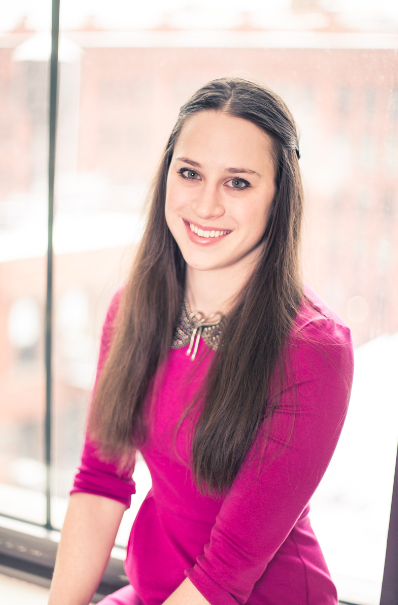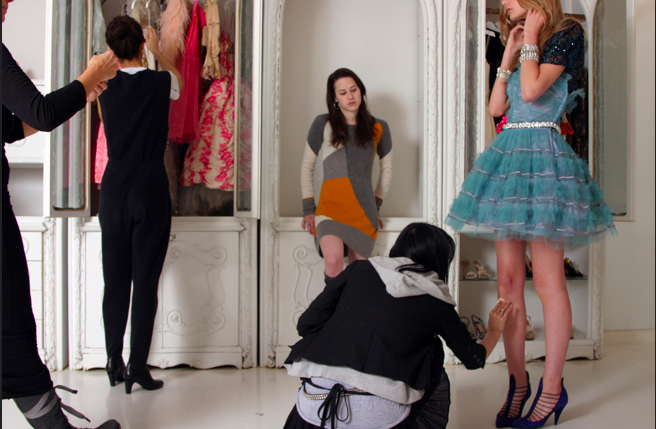
The only scene that moves faster than the tech industry is the tech startup industry.
In New York City, the next great competitor to Silicon Valley, Lindsey Green navigates this ever-accelerating world with remarkable aplomb. As vice president of SDKnickerbocker's tech public relations practice, she's nurtured emerging technology startups and digital brands including Lyst, Medium and Bustle—all while running her own tech PR firm, Ti14th Communications.
A respected journalist whose work has appeared in Forbes, New York Magazine, Deadspin and more, Green is a skilled storyteller who has deftly bridged the gap between traditional journalism and publicity. Also on her illustrious resume? Spending three years as director of communications at Jill Stuart, where she played a high-powered role in fashion PR.
We caught up with Green to talk about why driverless cars are the best, how she navigated the "very intense" fashion world, and why the tech industry is in need of more diversity.
What are some of the most exciting innovations you've come across while entrenched in the New York tech startup scene?
This might not be innovation in the traditional sense, but watching the leadership evolve has been the most exciting thing. New York City had a new wave of young, first-time founders 10 years ago who are now really leading this charge. Watching these people grow their companies and skills—while taking NYC from one of the smaller tech communities to a true startup scene—has been an overwhelmingly cool experience. It's been really fun to be a part of that. I'm looking forward to seeing where it all leads as we have new talent coming up each year.
How do you see technology shifting in the next 10 or 20 years?
Technology will be embedded in our lives in a much more seamless, almost invisible way. Also, driverless cars, y'all! Driverless cars will basically be the greatest thing to ever happen (especially for those of us like myself who are a little nervy around vehicles). I also hope for the continued popularity of cat GIFs.
How—and why—did you get involved in the tech field?
Totally by accident. I came to NYC 11 years ago and early on, found my people within a small group of "bloggers" and tech enthusiasts. I had no idea what any of it was or what any of them did at the time; they were just my pals. I learned about and began doing PR during my time in the fashion industry. When I left that world, the startup scene in NYC was really heating up. A lot of my friends and acquaintances were starting companies, and many of them had never spoken to media or didn't have a lot of experience with it. It started with me just giving advice over a couple of beers and it grew into a company from there.
To be honest, I avoided going into the tech industry for a long time. It was pretty terrifying that suddenly friends became contacts, or clients. I'm incredibly protective of my universe in that regard and if I ever feel that changing, I'm going to become a sheep farmer.
How do you think the tech scene in New York differs from that in Silicon Valley?
New York City is special because so many industries call New York their home base. There's fashion, publishing, broadcast, music, film, TV, advertising, finance—you name it. It breeds a lot of startups across many different industries. We also have the Brooklyn Bridge, so that's pretty excellent.
There's been a lot of talk about how male-dominated the tech industry is. How have you navigated the tech world as a woman?
Personally, I haven't navigated it in any particular way. I've worked with incredibly talented, high-powered men and incredibly talented, high-powered women. I've had good experiences on both sides and less than great experiences on both sides. I've seen companies with tons of female employees and then companies with close to zero. I don't necessarily think about diversity in tech in regards to just women in tech. I think we can do a better job all around to include more diversity in all aspects of the industry. I feel passionately about getting kids of every background involved in engineering and tech at an early stage in life. There's a lot of wonderfully smart people who champion the mission of diversity in the tech sector, and it's something I support.
You also have a background in fashion PR. What was it like working in the fashion industry? 
I was working at Jill Stuart as an assistant. Their team took a big chance on me and threw me into the PR mix early on. I had to learn on the job quickly and it was a great experience and opportunity. The fashion world is an incredibly fun place to work when you're young and just getting your career off the ground. There's lots of action, lots of movement, lots of interesting people. The only downside was that it's a very intense universe and the burnout factor can be real, particularly when you're running fashion shows every few months at the major Fashion Weeks of the world. I have a lot of respect for people who are able to rise to the top in the fashion industry. It's not easy.
How does tech PR differ from fashion PR?
Fashion PR is very product-based. While certain companies in tech are product-based, overall, I find tech PR to be a more narrative-focused field. You're telling stories in a more long-game situation, whereas in fashion you're working with designs and collections that are hitting in that very moment, so the strategies tend to be much more immediate and it can move a lot faster.
What is it about publicity specifically that appeals to you?
PR is tough. I equate being a communications executive to being a coach—you never really get to have good days unless the entire team wins. When one client is doing great, another one could be struggling, and you want your entire roster to find success, not just one or two big stars. What I love about PR is being able to help companies I believe in tell their story. When you're able to help someone launch or maybe going through a crisis, and it works, it's like confetti showering, champagne popping, winning the Super Bowl. When it doesn't work, it's like watching the second half of Titanic on a constant loop.
You also started your own company, Ti14th. Tell us about that.
I was essentially freelancing and lots of work began to come in, but there was zero organization or structure to any of it. If you know me, that will not surprise you. Eventually a friend looked at me and said, "You've got to stop writing your email address on bar napkins for people. Get some business cards!"
Great advice. I got some business cards. That's how it started.
Ti14th is described as "a team of journalists turned PR pros." How do you think the world of traditional journalism and PR inform one other?
When I ran Ti14th, I made a point of hiring writers whenever possible to fill the associate role. It's extremely useful to have people on your team that know both sides. They know what it's like to pitch, to be pitched, and how to tell a great story. PR can be a tremendous asset to journalists when it's done well.
What's your background in journalism? Why'd you make the leap to PR?
It's a bit more like what's my present in journalism. I had always been a writer/blogger in various capacities, but my passion is sports and athletes. I wanted to move into sports journalism, so in 2012, I put my former training and my complete (and somewhat bizarre) obsession with gymnastics to use and turned that into an opportunity to cover the Olympics for some pretty amazing outlets. I've been able to continue that and it's something that I want to keep expanding on.
If you've got some time to kill and want to learn everything there is to know about gymnastics, The Gymternet, or Jordyn Wieber, let me entertain you.
What advice would you offer other women looking to break into the world of tech and startups?
The world can be summed up in this quote from Eric Thomas:
"Don't cry to give up. Cry to keep going. Don't cry to quit—you're already in pain, you're already hurt. Get a reward for it."
